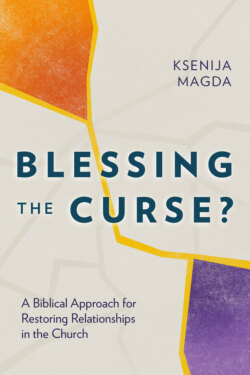Читать книгу Blessing the Curse? - Ksenija Magda - Страница 22
На сайте Литреса книга снята с продажи.
Confronting Abusive Hierarchical Family Structures
ОглавлениеIn family structures around the world, more rural cultures tend to be more hierarchical, and Christian women, who are driven by their desire to do what is good, often enforce these unhealthy hierarchical structures. In Africa, I have witnessed older women become outraged when they see younger women getting a profession and becoming economically self-sufficient. The older women describe the younger women as selfish and unchristian for insisting on their freedom.
In Eastern Europe, I have witnessed something of a cult of motherhood. In conferences, women who have many children are brought forward as examples of real Christian character. While many of these women are professionals in their everyday life, they are defined by their motherhood, which is the only area where they can prove their Christian worth. But defining women by motherhood keeps them out of the realms that “belong” to men, where they are expected to submit to men in all things. For as soon as women venture out of this proscribed territory, they are challenged and described as unholy.
In Asia, I have talked with women who were involved in ministry by helping their husbands, who were pastors and church planters. I asked them about their dreams and the vision God had given them for their lives. They stared at me, unable to understand what I was asking. We were talking through a translator, and eventually the translator asked, “What do you mean by vision?” At first, they seemed unable to understand the notion that God could speak into their lives as women, but as I explained, a lively discussion developed. The translator was drawn in, and I could only read their faces until a question surfaced: “Why must women work so much harder than the men?”
I later learned that during the lively conversation, they had been discussing the ministry they did along with their husbands – how they accompanied them to villages, talked with the women, and worked with the children, setting up and doing whatever else was needed. After they came home, the husbands would rest, because they deserved it after a long day of ministry, but the wife would continue working, preparing dinner, getting the children to bed, whatever else needed to be done.
Whether in Eastern Europe, Asia, or Africa, I have found that women are “allowed” to do a lot of things – such as support their husbands and the ministry vision – as long as they stay in the role of a submissive mother. In most cases, they carry this imbalance in work without question, transferring these behavioural patterns to the next generation by modelling the role of a do-it-all mother and teaching their children that women are defined by how they give up their lives to their husbands and children.
No Place for Abuse,[22] a study on violence against women in churches by Catherine Kroeger and Nancy Nason-Clark, describes how hierarchical relationships in marriage destroy partnerships and open up space for violence and abuse, including incest, which carries the trauma into the future. It has been painful for me to listen to wedding sermons that propagate this inequality agenda as a foolproof recipe for a godly marriage, as it runs against all the principles of a Spirit-filled life. A healthy relationship in marriage allows for parents to “rule over” their minor children together in love so that they do not come to harm. Though children need to be loved and guided into maturity and equality, the principle of “ruling over” does not apply to women. First, marriage partners are both adults, and they do not need permission or instruction from other adults – only council and discussion. Decision making depends on various capacities, such as learning, intellect, intuition, experience, and gifting – none of which are gender-specific. Only a hierarchical “order” judges a man’s view and judgment as a priori more important than a woman’s.
Second, inequality is impossible in a Christian marriage, where both partners have the Spirit of God, who leads them both into “all truth.” And as Paul says, whoever does not have the Spirit of God is not Christ’s. There is not one passage in the Bible that says that women receive the Spirit in a different measure than men.
Finally, parents must work as equal partners in the family because an equal standing enables them to share with one another and to fulfil their needs for intimacy in all areas of life. By working as partners in the work of parenting, parents expose their children to different parenting and personality styles. This exposure contributes to a balanced education and teaches children unity in diversity. Such a partnership model is necessary for healthy relationships in the family, for hierarchies that separate a mother and father as unequals open up the following treacherous dangers.
